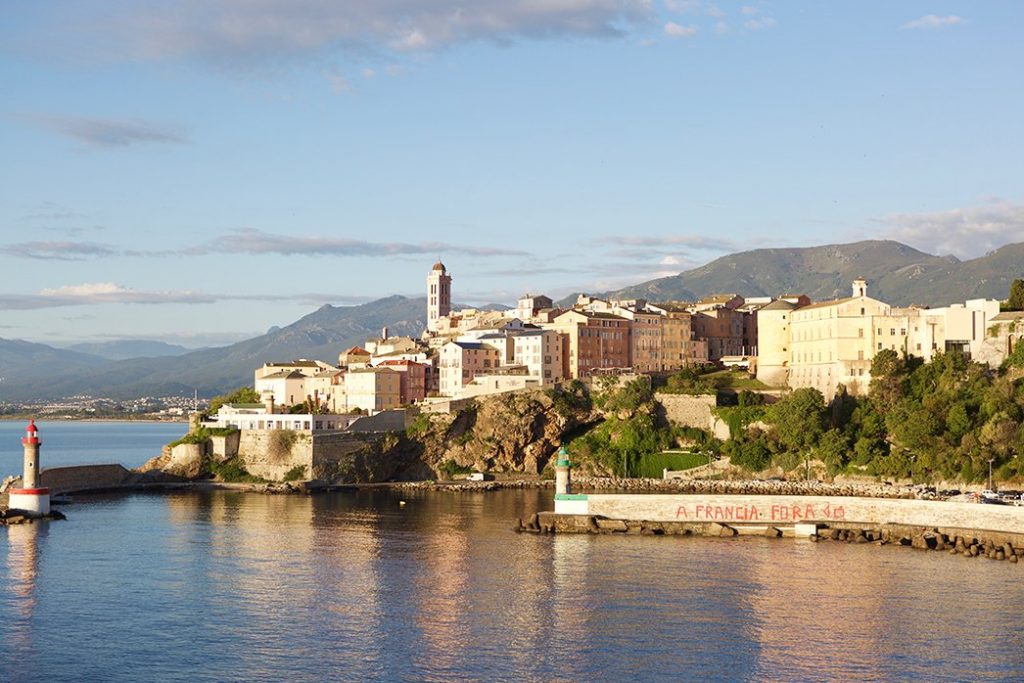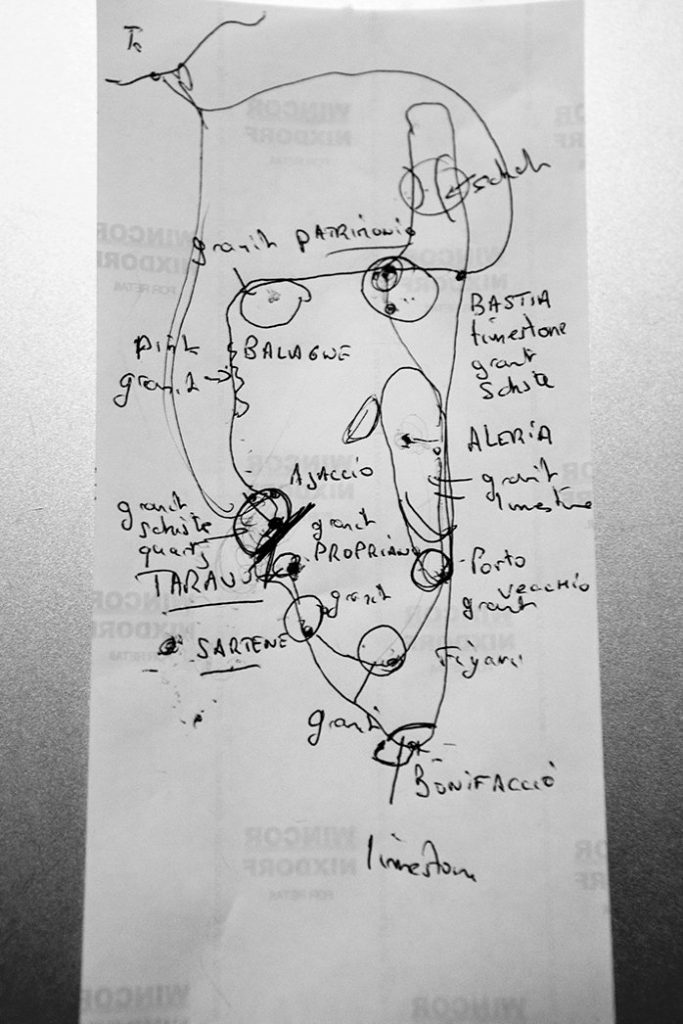
At precisely 4:15 Manu insisted that we leave the tasting. Traffic could be a bear going north on a Friday and we had a three-hour drive from Porto Vecchio to Bastia to catch our boat. Last year our trip was a more fluid route with less back and forth across the island. We started in Bastia and made one loop around the island and left from Ajaccio. Manu was nervous about the time but we made it with plenty to spare.
On the boat’s ninth floor lounge we ordered a couple of Pietra beers, the most well known Corsican suds. The waitress reluctantly took our order and that of a table next to us and then seemed to disappear. After twenty minutes passed I told Manu to forget it and to go to the bar to order what he wanted. He returned with a couple of beers and some peanuts and told the table next to us that someone told him she wasn’t coming back. We never did see her again.
A pair of singers started performing with recorded background music, occasionally playing a saxophone or guitar to add some complexity to their set. They were surprisingly good for a couple of ferry singers; the man sounded like Art Garfunkel and I had to look twice to make sure it wasn’t him. The ferry was a time warp between the music, the deteriorating décor and all the people dressed in 1980s fashion. I couldn’t decide if it was a rundown version of The Love Boat, or an at-sea version of the first act in The Shining.
We had a great view of the port of Bastia with the city lights illuminating the town’s colorful buildings and church. The light of our last day on Corsica was almost gone when the boat pushed off and curved north and the view changed to the dark sea between Corsica and Italy. Dinner was quick and passable. We drank a bottle of Dolcetto di Dogliani and had the seafood pasta special (a perfect pairing, I know…).
After dinner I was toast. I went to my cabin, brushed my teeth and hit the sack—hard. People joke that I live the easy life and my trips are a vacation, but they are by far the most exhausting days of my work. These trips throw the body off rhythm for weeks, and in my case, months. My body temperature changes dramatically between being in vineyards in the freezing wind, rain and sometimes snow, with hours a day in cold cellars. It’s not hard physical work, but with all the standing, talking and tasting, it’s a slow breakdown and it can take forever to get the chill out of the bones.
All of my senses are activated for more than fourteen hours a day. My eyes feast on the scenery and the people, and my nose is in the gym doing rep after rep. My tongue feels like a snake that sheds its skin every three weeks—loving high acid wine has its drawbacks. I’m hard of hearing, so I sometimes have to strain to catch and understand all the French thrown my way what with all its dialects that contain so many subtleties. My mind is on overdrive and my limitations are tested regularly, especially after first six weeks straight of tasting and travel on a ten-week trip.
I woke up at six with the help of the cabin crew announcement of our arrival to Toulon in one hour and as I showered I was thankful for the seven hours I slept. I met up with Manu and we headed down to his truck to disembark. It was early in France and late back home. No one was around and Manu and I took advantage of the free mental space of the early morning drive back to Avignon and stared off into road ahead without saying much. We were bushed and happy for the arrival of the weekend.
Manu dropped me at the Avignon TGV station. I grabbed my new rental car—number two of what would end up as seven on this trip—and headed back to La Fabrique to get some sleep and await the arrival of my wife the following Monday. I had thirty-six hours off and I took them.

There is no département in France quite like Corsica. Its separation from France by the sea and closer proximity to Italy is evident in every bit of its culture. I have been to France and Italy many times over the last two decades, and aside from the French language, the preservation of its Italian roots is obvious within the wines made from the island’s ancient varietals.
Corsican wines weren’t love at first taste for me; nor were many wines I’ve come to adore with time. There are many generic, rustic and unnecessarily heavy red wines that I could do without, Nielluciu for one, a beast that has yet to inspire me. I keep asking myself if I’m missing something and I look forward to my ah-ha moment with this grape.
Vermentinu is without a doubt a white wine of great potential. There is a broad range of styles from dense to lithe, and most are loaded with smells of ocean spray and minerals, unless they’ve been obliterated by oak.
Rosé is an obvious talent for Corsica. The red grapes there lend themselves perfectly for this kind of salty fresh wine with no shortage of aromatic expression and beauté. They’re tremendously pleasurable, many are seductive, and at the top domaines it’s easy to find sophistication. The simplicity employed in the making of these wines seems to serve them well and it’s when they’re done in this manner that they most carry the taste of the island.
Sciacarellu is the most compelling prospect, at least for me. Granite soils encourage a greater degree of elegance and salinity in the wines and this combination is one of the rare matches made in wine heaven. (I would also be interested to see more of it produced in the Patrimonio area on limestone and bottled alone). Sciacarellu has plenty of x-factor and will stand alone as a complex and pure wine of nobility without the addition of other grapes, no matter what soil it’s grown in. I’ve fallen for this grape and can’t wait to see it blossom even more with the rise of so many domaines.
I have no profound conclusion from my trips to the island and the time in-between, I’ve only found a better idea of what Corsican wine is to me. There are compelling high-end wines made by a select group of vignerons, and the quality across the island seems to be on the rise. Yet it is the basic range of wines from top producers, the least touched and overwrought, that best capture the joy and the charm of the island and its people.

